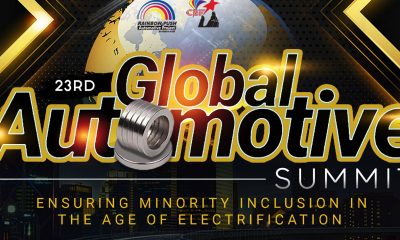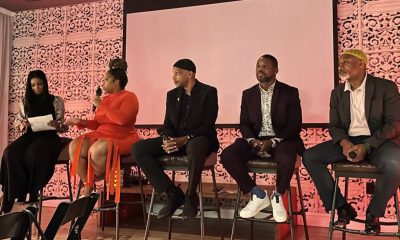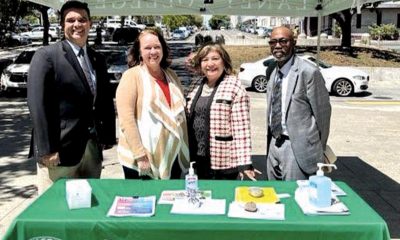#NNPA BlackPress
AUTO REVIEW: 2020 Toyota Corolla
NNPA NEWSWIRE — More than 50 years later, 50 million plus copies have been sold worldwide, making the Corolla the best- selling car ever. And despite a market that has turned sharply towards crossovers and SUVs, Toyota vowed not to turn its back on sedans as it introduced the 12th generation of the Corolla.
By Frank S. Washington, AboutThatCar.com
SAVANNAH, Ga. – If not for the Corolla, Toyota may not have survived in the American car market. It was small, fuel-efficient and reliable which was just what the driving public wanted.
More than 50 years later, 50 million plus copies have been sold worldwide, making the Corolla the best- selling car ever. And despite a market that has turned sharply towards crossovers and SUVs, Toyota vowed not to turn its back on sedans as it introduced the 12th generation of the Corolla.
Other than the wheelbase, which is still the same at 106.3 inches, everything else has changed. The car is wider. The front overhang has been shortened while the rear overhang has been lengthened. Neither by much but enough to improve the overall balance of the car.
For 2020, the Corolla is shorter overall. The hood has been lowered by 1.4 inches and the center of gravity has been lowered. They also lowered the side view mirrors and attached them to the front doors. What all this “lowering” has done is create an open airy passenger cabin.
The front seats were redesigned and I found them very comfortable, sort of form fitting, especially around my lumbar. Even the backseats, traditionally a cramped area in compact cars, were relatively comfortable. I had a good bit of leg room as well as ample headroom.
Toyota has created a Corolla for just about every driving appetite in the community. There were six trim lines and for the first time there is a hybrid.
The L, LE and LV HV are for entry-level consumers. The SE is for the sporty minded. It has two transmissions, a six-speed manual and a CVT with a first gear that gave it some snap. The XLE is, in a word, loaded. The XSE as Toyota put it, represents the best of both worlds.
Count the hybrid and there were three engine offerings. The gasoline electric had a 1.8-liter four-cylinder engine that made 121 horsepower and 105 pound-feet of the torque. It had a CVT, regenerative brakes and the Nickel Metal hydride battery was under the rear seat.
That gave it a lot of balance and the car didn’t see too heavy for the suspension. Toyota continues to stick with the nickel metal battery. Though heavier than Lithium-ion and more power dense, nickel metal costs less. Sometimes money does matter. This engine was rated 53 mpg in the city, 52 mpg on the highway and 52 mpg combined.
Well this was a hybrid and it had all the characteristics of such an engine. On one hand, it was extraordinarily quiet, smooth and certainly fuel-efficient, though we didn’t drive it that far. On the other hand, there was no power to speak of as with most small engine hybrid engines.
The 1.8 liter four-cylinder engine used in the gasoline-powered Corolla made 139 horsepower and 126 pound-feet of torque. With the manual, the L trim got 30 mpg in the city, 38 mpg on the highway and 33 mpg combine. With the CVT it got the same mileage. In XLE trim, it got one mile per gallon less across the board.
The 2.0-liter four-cylinder made 169 horsepower and 151-pound feet of torque. It had a combination of direct and port injection. It got 29 mpg in the city, 36 mpg on the highway and 32 mpg combined with the manual transmission. The CVT got 31 mpg in the city, 40 mpg on the highway and 34 mpg combined. The XSE got two miles less per gallon on the highway.
I didn’t get the chance to drive the 2.0 litre engine, but the staffers told me there was a big difference between it and the 1.8 litre engine — 30 more horsepower to be specific. However, I did test drive a Corolla Hatchback with that engine upon my immediate return. It was waiting for me at the airport.
Anyway, the hatchback had a CVT, thus, not much oomph was gained through the increase of horsepower. That’s the problem with CVTs, their power is subtle.
However, the upside was that this car got 32 mpg in the city, 42 mpg on the highway and 36 mpg combined. The downside was that the hatch lost rear passenger compartment space. That’s what happens when you lop off the trunk of a vehicle.
Still all of the engines on the latest model Corolla were solid with enough oomph to handle everyday driving. These compact cars have never been that big on power and the same holds true for the new ones even though they were more powerful and fuel-efficient.
The Corolla’s strength derived from mechanics, equipment and reliability. An eight-inch touch infotainment screen dominated the interior, which was really clean looking. Toyota engineers went so far as to eliminate unnecessary lettering on switch gear to enhance the minimalist look.
Depending on the trim, the new Corolla was equipped with ambient lighting but of course during the day we didn’t get the chance to see the full effect. There was a 4.2-inch TFT multi-information display in front of the driver located between the speedometer and odometer.
They lowered the hip point almost an inch and moved it an inch and half reward. The result was a lot more space and that equaled more comfort. And the car drove lighter.
Everything about the 2020 Toyota Corolla was trimmer. They lowered the belt line, slimmed down the instrument panel, and slimmed down the A pillars. Along with lowering the side mirrors, this created a car with elbow room and unobstructed visual sight lines.
Sound absorbing sealers, foams and silencers along with the new architecture rendered a really quiet automobile. Other than the engine under hard acceleration, I don’t remember hearing any road noise or wind noise.
It is all about connections in today’s car world. The 2020 Toyota Corolla has what you’d expect: satellite radio, voice controls and Bluetooth. But it also had Apple CarPlay, Amazon Alexa and Scout GPS. What’s more, a Toyota executive told us that Android Auto is on the way.
Oh, the 2020 Corolla has its own Wi-Fi connect that can service five devices. It’s got a 24-hour live concierge service, remote connect, service connect and safety connect.
Standard is Toyota Safety Sense 2.0. It is comprised of a pre-collision system that includes pedestrians and bicycles, adaptive cruise control, lane departure alert with steer assists, lane tracing assist, automatic high beams, road signage assist, blind spot monitor and brake hold.
Prices start at $19,500 for the L, $19,950 for the LE, the SE with a CVT starts at $21,950, with a manual transmission the SE starts at $22,650, the XLE starts at $23,950, the XSE starts at $25,450 and the Hybrid starts at $22,950. Add a $930 freight charge to all base prices.
This is far and above what was offered on the Toyota Corolla 50 years ago, but the car remains in the top tier of today’s compact cars.
Frank S. Washington is editor of AboutThatCar.com
#NNPA BlackPress
OP-ED: The Illusion of Allyship. White Women, Your Yard Signs Mean Nothing to Me
NNPA NEWSWIRE – “The blue bracelets are something White women are wearing so others can see that they didn’t vote for Trump,” says Liberal Lisa from Oklahoma on X. Chile, bye. These bracelets are hollow symbols, empty gestures that mean nothing to me. An accessory to claim distance from Trump’s legacy is superficial comfort, while the choice to not stand with us in the voting booth is far more profound.

Political yard signs can symbolize intentions and allegiance. But this year, they’ve also symbolized betrayal. During this general election, Black women were led to believe that more White women would stand with us. Exit polls, however, told a different story. Despite overwhelming displays of support, more White women still chose to vote for the convicted felon, reality TV star, and rapist. White women answered the call but left us hanging at the polls.
A Familiar Disappointment
I live in DeKalb County, Georgia, and the abundance of Harris-Walz yard signs could’ve fooled me. But I’ve seen this before, back when Stacey Abrams ran for governor. White women showed up, put up signs, attended rallies, knocked on doors, and phone-banked. Yet, when it came time to vote, they let us down—not once but twice. I’ve been here for over 15 years, and if there’s one thing I know, it’s that political signs are symbols without weight.
In every election, I’ve talked with White women. Most aren’t the primary earners in their families and vote along party lines, aligning with the preferences of their fathers and husbands. These conversations reveal a reluctance to break from tradition, even when their votes affect women and certainly when their votes impact the lives of people who look like me.
The Illusion of Solidarity—Symbols Are Not Enough
On social media, I’m seeing White women posting pictures of blue bracelets to “prove” they didn’t vote for Trump. “The blue bracelets are something White women are wearing so others can see that they didn’t vote for Trump,” says Liberal Lisa from Oklahoma on X. Chile, bye. These bracelets are hollow symbols, empty gestures that mean nothing to me. An accessory to claim distance from Trump’s legacy is superficial comfort, while the choice to not stand with us in the voting booth is far more profound.
I’ve seen Black Lives Matter signs and black squares posted on Instagram to “prove” support for Black people, but we now know that was a lie, too. Will those same people who claimed Black lives mattered now take down their Harris-Walz signs and show their true selves?
Navigating these truths is a daily struggle for me—professionally and socially. White women often misuse their privilege, supporting us only when it’s convenient. Seeing overqualified Black women sabotaged or abandoned by White women at critical moments is a constant emotional challenge. It’s exhausting to live with this reality, especially when solidarity seems like something they pick up and discard at will.
One clever campaign ad from Harris-Walz that spoke directly to White women. “Your Vote, Your Choice” emphasized that their vote was private—independent of their household situation. Another was from Olivia Howell Dreizen, the “Vote Without Fear” campaign, which empowered women to consider the greater impact of their choices. But it seems many still couldn’t choose the roadmap to freedom—even when it was handed to them.
A Call for Action Beyond Words
White women, I want to believe you care, but actions speak louder than yard signs, bracelets, or Instagram posts. Show up in our communities, advocate in your workplaces, and stand up to dismantle the structures that uphold white supremacy. Only through real action will we know where you stand.
If you choose not to act, we see you—and we know exactly where you stand. Good luck these next four years.
Disclaimer: The views and opinions expressed in this article do not necessarily reflect the official policy or position of BlackPressUSA.com or the National Newspaper Publishers Association.
#NNPA BlackPress
Supernova Parenting Conference Empowers Over 100 Parents with Resources for Neurodivergence and Mental Health
The inaugural Supernova Parenting Conference was co-hosted by Natasha Nelson, known as Supernova Momma, and Yolanda Walker, founder of Parenting Decolonized. It brought together over 100 parents, caregivers, and educators dedicated to fostering understanding and support for neurodivergent children and mental health challenges. The conference provided invaluable resources, expert insights, and a collaborative space for […]

The inaugural Supernova Parenting Conference was co-hosted by Natasha Nelson, known as Supernova Momma, and Yolanda Walker, founder of Parenting Decolonized. It brought together over 100 parents, caregivers, and educators dedicated to fostering understanding and support for neurodivergent children and mental health challenges. The conference provided invaluable resources, expert insights, and a collaborative space for connection, marking a significant step toward creating a more inclusive parenting community.
The event featured a variety of workshops, panel discussions, and keynote speeches from leading experts in neurodiversity and mental health. Attendees left with practical tools and strategies to enhance their parenting journeys, emphasizing the importance of understanding and supporting the unique needs of neurodivergent children.
“While the conference was a tremendous success, we believe that our work doesn’t end here,” said Natasha Nelson. “It’s crucial to continue providing ongoing support and resources for parents as they navigate this important journey. We want to ensure families can access the tools they need long after the conference.”
To extend the momentum generated at the conference, Natasha and Yolanda are excited to announce the launch of the Supernova Parenting Community. This membership-based initiative aims to offer a safe and supportive environment for parents and caregivers to continue their growth as conscious parents.
Membership is available for as little as $5 a month via Patreon, making it accessible for all families seeking support.
“We know that parenting can be a challenging journey, especially when navigating neurodivergence and mental health issues,” Yolanda Walker added. “Our goal is to build a community where parents feel seen, heard, and supported. We hope you’ll join us in this vital work.”
For more information about the Supernova Parenting Community and to sign up for membership, please visit supernovaparenting.org
#NNPA BlackPress
Election Night on The Yard at Howard University
Election Night on The Yard at Howard University
-

 Alameda County4 weeks ago
Alameda County4 weeks agoAlameda County District Attorney Pamela Price Announces $7.5 Million Settlement Agreement with Walmart
-

 Activism3 weeks ago
Activism3 weeks ago‘Jim Crow Was and Remains Real in Alameda County (and) It Is What We Are Challenging and Trying to Fix Every Day,’ Says D.A. Pamela Price
-

 Bay Area3 weeks ago
Bay Area3 weeks agoIn the City Attorney Race, Ryan Richardson Is Better for Oakland
-

 Activism3 weeks ago
Activism3 weeks agoOakland Post: Week of October 30 – November 5, 2024
-

 Alameda County3 weeks ago
Alameda County3 weeks agoD.A. Price Charges Coliseum Flea Market Vendors in Organized Retail Theft Case
-

 Activism3 weeks ago
Activism3 weeks ago‘Criminal Justice Reform Is the Signature Civil Rights Issue of Our Time,’ says D.A. Pamela Price
-

 Activism3 weeks ago
Activism3 weeks ago“Two things can be true at once.” An Afro-Latina Voter Weighs in on Identity and Politics
-

 Arts and Culture3 weeks ago
Arts and Culture3 weeks agoMacArthur Fellow Jericho Brown’s Poetry Reflects Contemporary Culture and Identity
























































